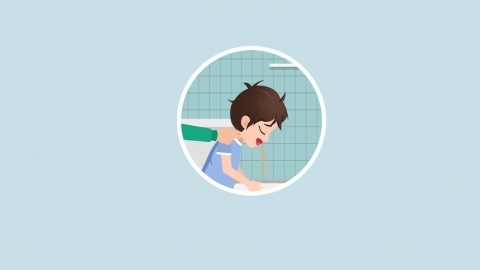Why is my child only vomiting without diarrhea or fever, and what should I do?
Generally, the main causes of vomiting without diarrhea or fever in children include improper feeding, abdominal coldness, pediatric acute gastritis, gastroesophageal reflux disease, and increased intracranial pressure. If symptoms occur, it is recommended to seek timely medical treatment at a regular hospital. Detailed analysis is as follows:
1. Improper Feeding
Feeding a child too quickly, excessively, or with overly greasy, raw, or cold food can increase the gastrointestinal burden and cause gastrointestinal motility disorders, leading to vomiting. Adjust feeding methods by providing small, frequent meals of bland and easily digestible foods, such as millet porridge or soft noodles. Gently patting the child's back after feeding helps release gas, and the child should not be laid flat immediately.

2. Abdominal Coldness
Exposure of the child's abdomen or insufficient clothing and covering may cause gastrointestinal smooth muscle spasms due to cold exposure, affecting gastrointestinal function and causing vomiting. It is important to keep the abdomen warm in daily life. Wearing an abdominal wrap may help. When vomiting occurs, apply a warm towel to the abdomen for 10-15 minutes to relieve gastrointestinal spasms, and encourage the child to drink warm water to replenish fluids.
3. Pediatric Acute Gastritis
Bacterial or viral infections of the gastrointestinal mucosa may cause acute gastritis, with inflammation stimulating the gastric mucosa and resulting in vomiting. Diarrhea and fever may not appear in the early stages. Under a doctor's guidance, administer medications such as Xiaor Jianpi Huaji Oral Liquid, Hydrotalcite Chewable Tablets, Amoxicillin and Clavulanate Potassium Dry Suspension, to protect the gastric mucosa and fight infection. In severe cases of vomiting, Vitamin B6 Tablets may be used as an antiemetic.
4. Gastroesophageal Reflux Disease
Underdeveloped lower esophageal sphincter muscles in children allow stomach contents to reflux into the esophagus, irritating the esophageal mucosa and causing vomiting, often after meals or when lying flat. Under a doctor's guidance, medications such as Omeprazole Enteric-coated Capsules, Domperidone Suspension, and Sucralfate Suspension may be used to inhibit gastric acid secretion, promote gastric motility, and protect the esophageal mucosa. Elevating the upper body slightly during sleep may help reduce reflux.
5. Increased Intracranial Pressure
Increased intracranial pressure caused by conditions such as brain tumors or hydrocephalus may compress the vomiting center, causing projectile vomiting without diarrhea or fever. Immediate medical attention is necessary. If diagnosed as hydrocephalus, ventriculoperitoneal shunting may be performed. If a brain tumor is present, surgical removal may be required depending on the specific condition. Postoperatively, under a doctor's guidance, medications such as Mannitol Injection, Furosemide Tablets, and Vitamin B1 Tablets may be administered to reduce intracranial pressure and provide nerve nutrition.
In daily life, maintain good dietary hygiene and avoid spoiled food. Establish regular feeding patterns and avoid overeating. Monitor weather changes and adjust the child's clothing accordingly. Closely observe the child's mental status during vomiting episodes, and seek immediate medical care if symptoms such as drowsiness or frequent vomiting appear.




